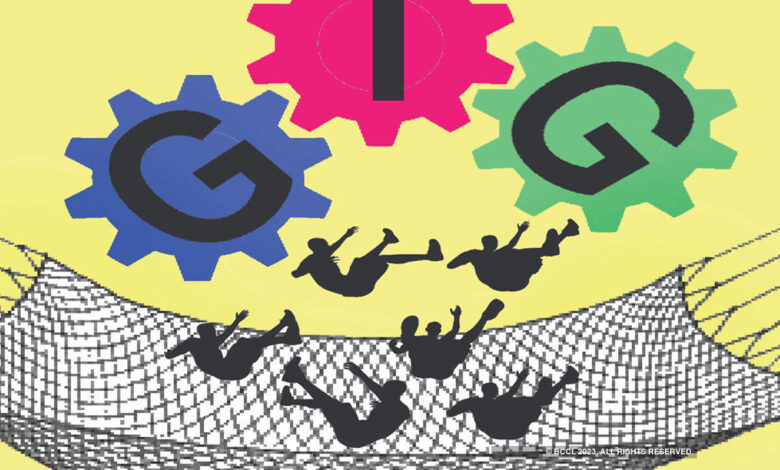The Impact of the gig economy on Politics and labor policies

The gig economy is rapidly growing and transforming the labor market worldwide. It has created numerous opportunities for people seeking flexible work arrangements, increased earning potential, and better work-life balance. However, the gig economy has also raised concerns about job security, worker exploitation, and the erosion of labor rights. The impact of the gig economy on politics and labor policies is a complex issue that requires careful examination. In this article, we will explore the different ways in which the gig economy has influenced politics and labor policies.
Introduction
In this section, we will provide an overview of the gig economy and its impact on the labor market. We will define what the gig economy is and provide some statistics on its growth. We will also discuss the advantages and disadvantages of the gig economy.
What is the Gig Economy?
The gig economy refers to a labor market characterized by short-term contracts or freelance work, as opposed to permanent jobs. It is also known as the on-demand, sharing, or platform economy. In the gig economy, workers are paid for individual tasks or projects, rather than for hours worked. Examples of gig economy jobs include ride-sharing services like Uber and Lyft, delivery services like Postmates and Grubhub, and freelance platforms like Upwork and Fiverr.
Statistics on the Gig Economy
The gig economy has experienced rapid growth in recent years. According to a report by Intuit, 34% of the US workforce is currently made up of gig workers. Another report by the European Commission estimates that the gig economy accounts for around 8% of the EU workforce. In the UK, the number of people working in the gig economy increased by 70% between 2010 and 2018.
Advantages of the Gig Economy
The gig economy offers several advantages to workers. Firstly, it provides a flexible work schedule that allows workers to work whenever and wherever they want. This is particularly beneficial to those who need to balance work with other responsibilities like childcare or caregiving. Secondly, the gig economy offers the increased earning potential, as workers are paid for each task they complete, rather than a fixed salary. Finally, the gig economy offers workers the opportunity to gain new skills and work experience.
Disadvantages of the Gig Economy
Despite its benefits, the gig economy also has several disadvantages. Firstly, gig workers lack the job security that comes with permanent employment. They are often at the mercy of the platforms that connect them with clients and may be subject to sudden changes in pay rates or job availability. Secondly, gig workers are often excluded from traditional labor protections like minimum wage laws, workers’ compensation, and unemployment benefits. Finally, gig work can be physically and emotionally demanding, with workers often working long hours for little pay.
The Impact of the Gig Economy on Politics
The growth of the gig economy has had a significant impact on politics, particularly in the areas of labor policy and regulation. In this section, we will explore how the gig economy has influenced political debates and policymaking.
Political Debates on the Gig Economy
The gig economy has become a hot topic of political debate in recent years. Some politicians and policymakers argue that the gig economy is a boon to workers, providing them with flexibility and increased earning potential. Others argue that the gig economy is exploitative, and that gig workers are being denied basic labor protections.
Regulation of the Gig Economy
The regulation of the gig economy has been a contentious issue for policymakers. Some countries have introduced laws to protect gig workers’ rights, such as minimum wage laws and collective bargaining rights. Others have taken a more hands-off approach, arguing that excessive regulation could stifle innovation and harm workers by reducing job opportunities.
The Impact of the Gig Economy on Labor Policies
The growth of the gig economy has also had a significant impact on labor policies. In this section, we will explore how the gig economy has influenced the way governments and employers approach labor policies.
Shifting Responsibility from Employers to Workers
One of the key ways in which the gig economy has influenced labor policies is by shifting responsibility from employers to workers. In traditional employment relationships, employers are responsible for providing workers with benefits like healthcare, retirement plans, and paid leave. In the gig economy, however, workers are often classified as independent contractors, meaning that they are responsible for providing their own benefits.
This shift in responsibility has raised concerns about worker exploitation and the erosion of labor rights. Without the protections provided by traditional employment relationships, gig workers may be vulnerable to exploitation and may lack access to important benefits like healthcare and retirement plans.
Reevaluating Labor Laws
The rise of the gig economy has also led to a reevaluation of labor laws and regulations. Many countries have outdated labor laws that do not take into account the changing nature of work in the gig economy. As a result, policymakers are faced with the challenge of updating labor laws to protect gig workers’ rights without stifling innovation and job creation.
Some countries have already taken steps to address this issue. For example, in the UK, the government established the Taylor Review in 2017 to examine the impact of the gig economy on labor rights. The review recommended a number of policy changes, including the introduction of a new employment status for gig workers that would provide them with greater protections.
Increasing Unionization
The gig economy has also led to an increase in unionization among gig workers. As gig workers become more aware of the lack of protections and benefits available to them, many are seeking to organize and advocate for better working conditions. This has led to the emergence of new types of unions, such as the Independent Workers’ Union of Great Britain, which represents gig workers in the UK.



